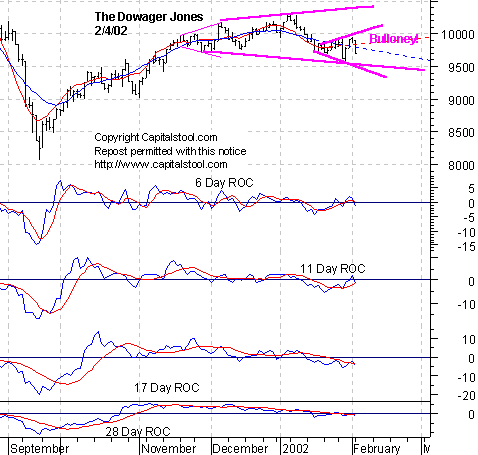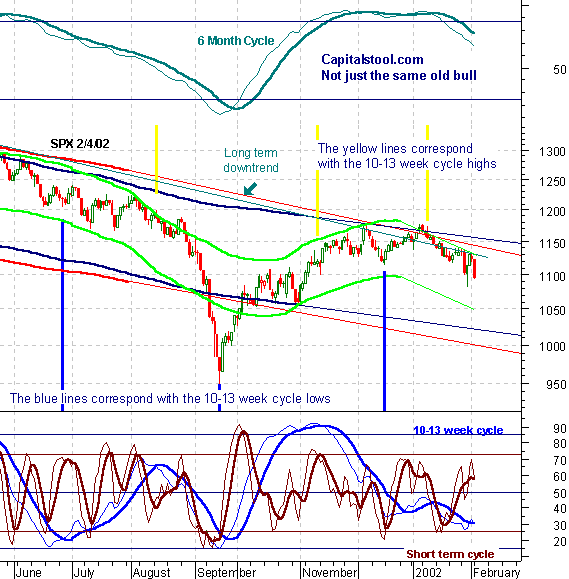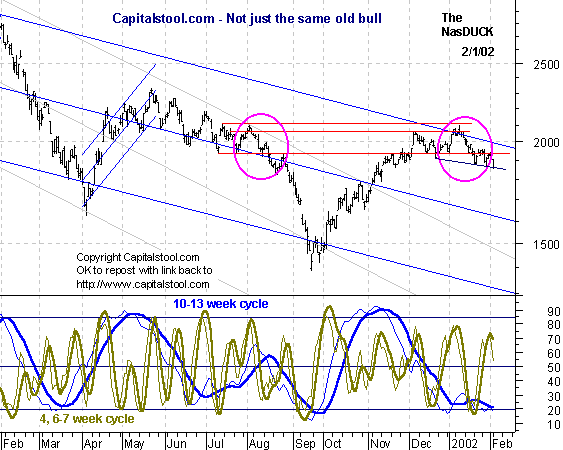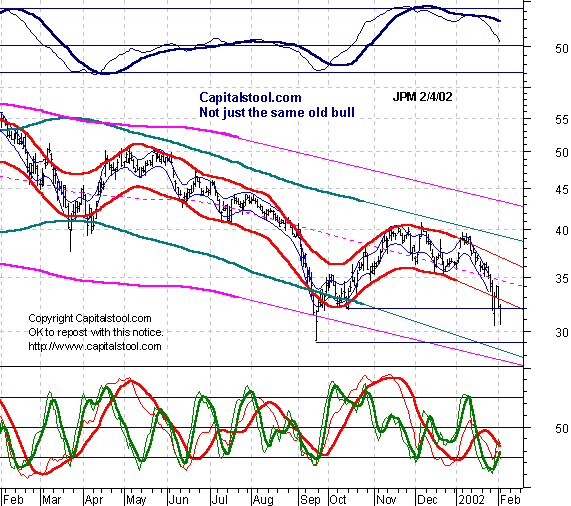|
[menu.htm]
|
The Anals of Stock ProctologyPublished 5 times
per week by the American Academy of Stock Proctology and Available by annual subscription for $1929 or free Welcome to the The Anals of Stock Proctology, the new scholarly journal of the American Academy of Stock Proctology, edited by the world famous founder of the study of Stock Proctology, Dr. Stepan N. Stool PHandD. The Anals replaces Capitalstool's nightly and weekend updates of the major stock indexes. Now you can get your nightly stock proctology report in one convenient, uncluttered page, right here. The Anals will be available for free, for the immediate future. Soon, however, all advertising and solicitation will be removed from the Anals, and access to the Anals will be restricted to subscribers. As a result of the clean format, the Anals will be readily printable for reading in locations more appropriate to such endeavors, such as, uh, the kitchen table. Yes. The remainder of the site, including The Stool Pigeons Wire, IntradayStool, Stoolhoo, and Stoolchat, will continue to be free. You will never have to pay for access to these pages. Previous contributors to Capitalstool will receive a free subscription period. Prior to going to a subscription format, the voluntary pay buttons will remain. So feel free to contribute now. Your contribution will result in a full credit toward your future subscription. Several of you have already contributed in excess of $500, and you will receive a free lifetime subscription. Contributors of written content or illustrations used on the Capitalstool front page will also receive free subscriptions. That includes all who achieve the level of Professor of Stock Proctology on the Stool Pigeons Wire. Initial subscription rates will be $19.29 quarterly or $74 per year, in honor of the great bear markets of the 20th century. Actually, 1937 was pretty bad too, so the Academy may offer a half year subscription for $37. Latecomers will be able to get a one time, one month trial for, what else? $6.66. As always I thank you for your support, and I look forward to many prosperous years working together with you. Happy New Year to you and to Bears the world over! Dr. Stepan N. Stool December 30, 2001
Monday morning, with the futures beginning to come unraveled, we got word through Wall Street's infomercials networks that a couple of the biggest borkers were instituting another borking, this time in guess what, semiconductors, and semiconductor equipment stocks. These sectors are the most popular borking targets because they are the most heavily traded momentum engines. In the right environment they have the potential to ignite the entire market. They also present the biggest problems for the borkers, when the public loses patience with these stocks and dump them. Regular readers know that a borker is a firm, also known as a borkerage, that is in the business of borkering. Borkering, or borkiong for short, is the selling stocks out of the firm's own inventory to the suckers, er, ah, I mean, its customers, on the recommendation of its shills, also known as analcysts and market strat-ego-ists. The borker's market making arm, which may be a NYSE Specialist operation, or a Nasdaq market maker, has either wittingly, or unwillingly been forced, to overload with a certain type of inventory. In this case it was the semiconductor equipment stocks which the public has been dumping in size in recent weeks. In order to get rid of this unwanted inventory, Goldman Sucks put the bork on AMAT, KLAC, TER, ATMI, and NVLS. Normally a borking like this gives the firm's market makers several days to feed the stock off on the borkerees, generally the portfolio sphincters in charge of shrinking your formerly swollen retirement funds. The borkerees are usually quite willing to buy enough stock to give the borker a handsome profit. Last week, however, we saw a major borking by Mohel Lynch (Oy do we got tips for you) in Untel. Borkers love heavily traded stocks, and especially those with giant market cap because it enables them to more easily disguise the age old practice of pump and dump. Somehow, if it's Dow stock, it seems more respectable. But last weeks borking of Untel did not last long enough to fool enough people. Everybody that got borked on Thrusday is now sitting with a loss. This did not bode well for Monday's borking of the Semiconductor Equipment stocks by Golden Sacks, and the borking of a group of semiconductor stocks CSFB, ( Kiss-and-Fib). This was either very stupid timing, or a sign of exterme desperation by the borkers. Indeed, the borking could only be successfully supported for about 4 hours. By the end of the day most of the stocks were below Friday's level, or well on their way. If the borkers miscalculated, and they are now stuck with inventory they could not unload, this will only add to the market's downside illiquidity in the days ahead. Should be fun to watch. The Dowager spent the day basically falling apart, with the exception of a brief bounce around mid-day. The index closed down 220, at 9687, just a tick above its low of the day. The Dow is the index the Street insiders want the public to see. It is the most easily manipulated, since 3 specialist firms control all 20 stocks. The index remains in its Bulloney Bullhorn formations. Followers of Dr. Stool will also recognize the developing Hunchback formation with the weak right shoulder that is now near completion. The shoulder line of the formation is downsloping, and now lies just above 9500. When this level breaks, the Hunchback will fall down. |
|||||||||||||||||||||||||||||||||||
|
SPX Charts The Portfolio Sphincters measure their performance against the benchmark Portfolio Sphincters' Index. The index dropped 27.76 to 1094 breaking a key level formerly known as support. (No such thing as support in a bear market.) This is where the swan dive phase begins. The VIX shows only a minor move into neutral ground. The behavior of investors remains remarkably similar to last summer. We are now in the late August part of the cycle. The slope of the decline ahead may or not be as severe as last September's, but should last a good deal longer. This will not be just a 15 day selloff followed by an immediate recovery.
This is very early in the 6 month cycle down phase. That cycle is 6 months in name only. It can be as long as 10 months. Prices are heading for the lower long term channel boundaries. The dark blue channel is the 12-18 month cycle. That cycle's slope should now become more negative. The short cycle is just now turning down, meaning that the next 10-15 days should be marked by severe weakness. The 10-13 week cycle just made a second peak. It is in a position similar to late August, but appears to be even weaker now.
The next fiber nacho retracement level is around 1050, where the central trend tendency also lies. That won't hold. Nor will the 61.8% level. This baby's going all the way back and then some.
SPX Cycle Conditions as of 2/1/02
L-Low,
H-High Nasdaq Charts The Nas lost 55.71, closing at 1855, after a very minor bounce at the bell. There was an hour long bounce around mid day, but other than that and the bounce at the bell, it was all downhill. The Nas's position is also similar to late August in cyclical terms, so here again there doesn't seem to be a reason to expect anything other than the same outcome. 1400 here we come, doodah, doodah.
Here's another clear picture of the Hunchback Formation. The market will probably gap the shoulder line, causing the I've Fallen and I Can't Get Up pattern.
Nasdaq Cycle Conditions as of 2/1/02
L-Low,
H-High WhoLit Packdog has been doing well of late, and Moanday morning the company raised guidance for the first quarter. Helluva lot of good that did. Consider it a sell signal. This stock's cycles are topping out a little behind the market. There are some funny things going on, on this chart, having to do with the proposed Compaq merger. Beware.
JP Moogan continues to implode. The cycles are breaking down, and cycle channels should begin to slope down more sharply. There are other major bank stock charts that look almost this bad. As go the banks, so goes the stock market, especially in these days where they are so directly involved in stock trading. Troubled banks liquidate all kinds of trading vehicles, including stocks.
See you in Intraday Stool. Let us know what you think on the Stool Pigeons Wire. Archive
|

![[Most Recent XAU from www.kitco.com]](http://www.weblinks247.com/indexes/idx24_nasdaq_en_2.gif)
![[Most Recent XAU from www.kitco.com]](http://www.weblinks247.com/indexes/idx24_sp500_en_2.gif)







